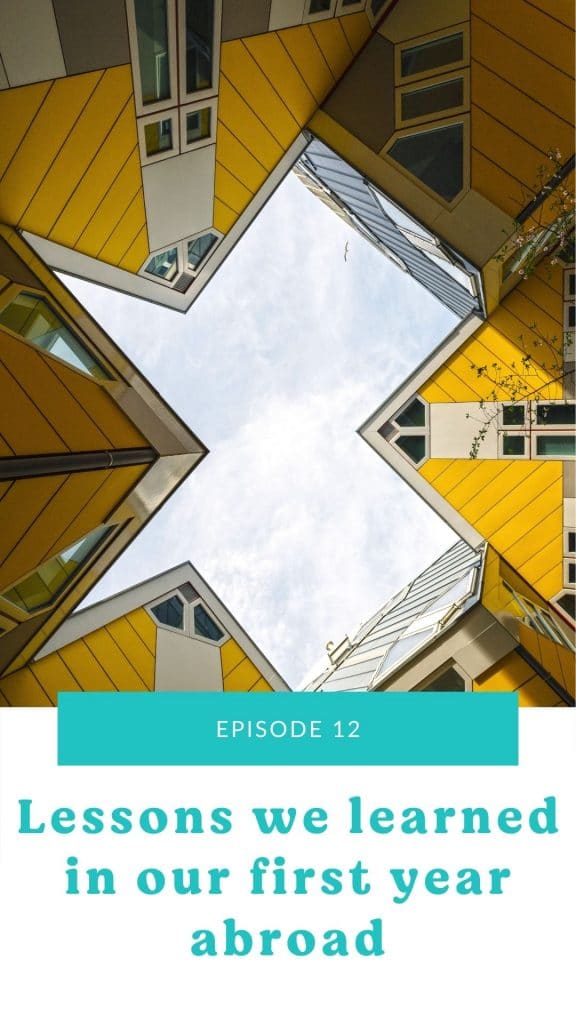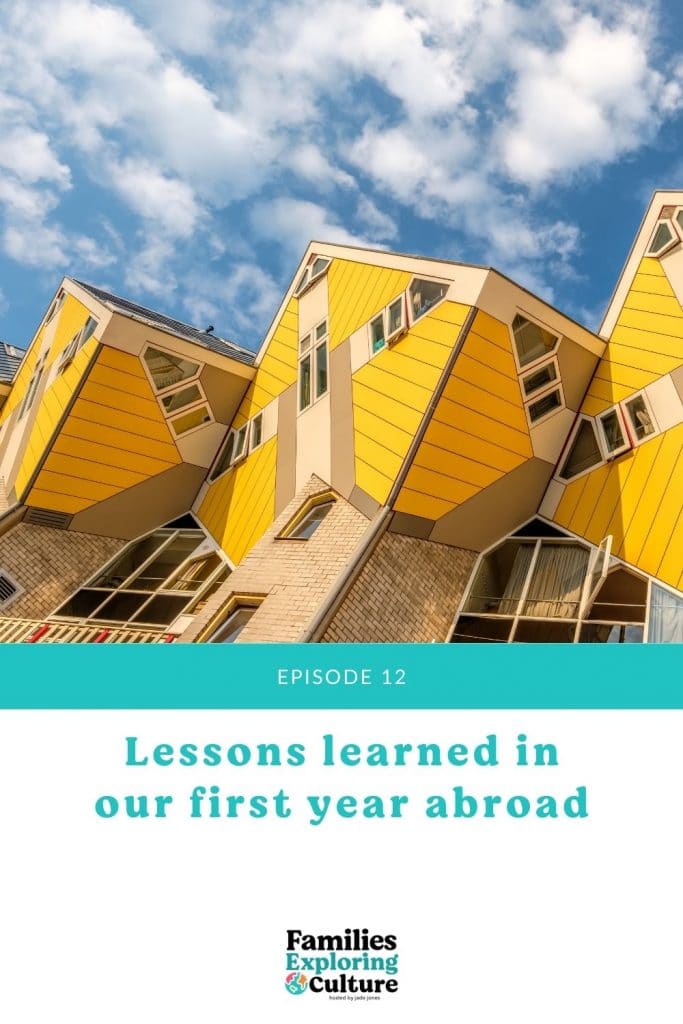12: Lessons learned in our first year abroad
Moving to a foreign country as a family can be a scary prospect but it is also incredibly enriching! Here are the three most valuable things we learned in our first year of living in the Netherlands.

Table of contents
This week is the one year mark since we left the United States and moved to the Netherlands. It is incredible to look back over this year and realize how much we have experienced and endured. We made some mistakes as we moved overseas but we have also seen so much growth.
I wanted to share with you some of the things I am grateful to have learned in this first year abroad that I know I would not have been able to learn otherwise.
Some of these experiences have helped develop my empathy for the plight of others. Other experiences have shown me how very similar we truly all are.
Most of all, these experiences have shown me how much richer my life is by getting to know people who have lived very different lives from me.
Moving to a new place without speaking the language is scary and overwhelming
In the four months that we had between finding out we were moving to the Netherlands and arriving in the country, we tried to learn as much Dutch as we could. According to a study done by the organization, English First, the Netherlands has the highest English proficiency of non-native English speakers in the world. We hoped that the high English proficiency would help us in our transition period and would give us some leeway as we progressed in our language skills.
However, I quickly realized how woefully unprepared I was! It didn’t occur to me that although more than ¾ of the population speak English, almost everything written is in Dutch. Things like filling out paperwork for housing and schools for my children, going shopping, reading a map, and making appointments were long processes as I had to use google translate for everything or ask friends for help. I still struggle with making phone calls especially if there is a menu to get through before I can reach an actual person.
I can much better empathize with immigrants and refugees who arrive in a new country. The difficulty of navigating bureaucracy and all of the little things that are required to set up a new life for a family is incredibly overwhelming.
I could not have made it through those first few months without friends who took me shopping, showed me how things work, explained what products were, and where to find needed supplies. There are times where they would translate for me or fill me in on what I missed listening to a conversation.
We were blessed to have new friends who invited us into their homes for the holidays and on excursions with their families. They were a much needed lifeline during a period when I felt like I wasn’t going to make it.
Ways you can help someone who is a non native speaker
As we’ve interacted with people from all over the world through my husband’s MBA program, my children’s school, and at church, I’ve also learned some important practices to use when speaking in someone else’s second language, things that I have appreciated when people do them for me.
- Speaking slower makes it easier to follow along, hear the words spoken, and allows time to do the translations in your head. Along with this is not assuming because someone is communicating well so far that you can start speaking faster and in more complex sentences. Get to know a person and a feeling for their skill level before you start speaking faster. I can generally do well following along with a conversation in Dutch, that is until it speeds up. Then I get stuck trying to figure out what they were talking about two sentences back and end up completely lost. Or there are the times where I manage to successfully use my limited Dutch and the person I’m speaking to assumes my skills are well beyond what they actually are. I am quickly humbled and remember why I rarely use my Dutch unless I am in a situation where I know my skills are sufficient. Grocery shopping I’m good at but visiting the doctor I’m not.
- Using simpler language and phrases and avoiding idioms. Idioms are phrases whose meanings can’t be understood from the words themselves such as “over the moon” or “speak of the devil.” My Dutch skills are about the same level of a toddler. At one year in, I follow along with Mickey Mouse Clubhouse really well! Anything too far beyond that level, I’m not so good with.
- Looking at the person you are speaking to and clearly annunciating. There’s no need for over exaggerating annunciations but by looking at the person and annunciating it is easier to hear and discern what is said and allow for lip reading to help fill in gaps where hearing is missed. How many times do we get frustrated with a family member for talking to us just out of seeing or hearing range? I do this often with my children and will ask them to look at me when they talk to me so I can hear them! Now imagine going through the same thing with someone in their second language.
The value of a second language
I’ve also learned how valuable a second language is and how much I could someday bless someone else who is overwhelmed in a new place. I wished I had been more dedicated in my Spanish studies since there were so many parents at my children’s last elementary school in the US who spoke Spanish as their first language. There were many times where communicating with them in Spanish would have helped overcome some of the miscommunications or confusions that come with speaking in your second language. Plus, I could have made some new friends!
Our family is now committed to learning a more widely spoken language as a family so we can be of assistance someday to someone else.
If you are feeling like this is something you would like to do, last week’s episode I talked with my friend Adelaide about learning a second language as a family. She has an incredible company which helps families learn a second language in a really natural way! I’ll also be sharing some of her program in my Instagram stories so make sure you are following me there.
Some experiences are universal
We’ve been blessed to interact with other expats from all over in addition to our Dutch friends. My older children attended a special school for non-Dutch speakers. There we met families who were from Asia, the Middle East, Africa, and other parts of Europe.
As we got to know these families and we shared our frustrations and struggles, I realized how often we were experiencing the same thing. There were the struggles with our children- some big, some small. Worries over how to help them navigate their own feelings, the overwhelm of living in a new place and fears of not making friends. Challenges with children who are picky eaters or how to limit the fighting and arguing between siblings. Concern over too much technology use and how to teach our children better decision making skills.
Sometimes we discussed the challenges of navigating our extended families or the hilarious missteps that we have had as married couples. I also learned that you can always tell when a child is whining, no matter what language they are doing it in.
In my interviews with other expats for this podcast, I’ve also seen the similarities they have shared in the challenges and benefits they have experienced. It seems that no matter where you live in the world it is hard to be far from the support system of family and friends.
Yet they have all shared how good it has been for them and their children to learn resiliency and compassion. They have realized how much they are capable of because they have had to do it on their own.
Relationships thrive when we find these common feelings and experiences. It has been confirmed even more for me that these shared experiences can be found with people no matter where you are in the world.
Children are incredibly resilient
We did worry, especially right after we moved here, that we might be inflicting lasting trauma to our children. Although the challenges of third culture kids (children who are growing up outside of their home culture) are lasting, we’ve also found that our children are much stronger than we realized.
We were amazed at how fast they learned Dutch and how much confidence they gained as they learned new skills like navigating public transit and getting themselves to and from school.
My children have begun to translate for us and we now ask them for help with pronunciation or how to say certain things. They have developed a lot of pride in becoming the teachers instead of the students as they have helped us become more proficient in Dutch.
For our family, our previous experiences of moving frequently meant that our children were better prepared for an even more difficult move abroad. We also know from past experience that we can model for and support our children to have courage and be brave in new and uncertain situations.
Throwing our children into new situations can often cause short term emotional distress, but it can also enable them to grow. I hope that you can seek ways to push your children to interact in new social circles with people they may not think they have much in common with.
Although moving to another country has not been without its challenges, we have experienced so much growth and expanded understanding because of it. I am grateful for this opportunity to get to know more people and to develop more empathy and love. These experiences will help me to be a better community member and a better advocate for those who need one.
Other episodes you may like


